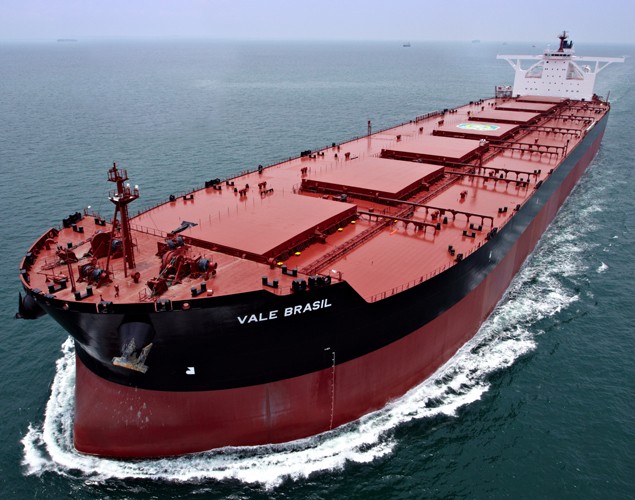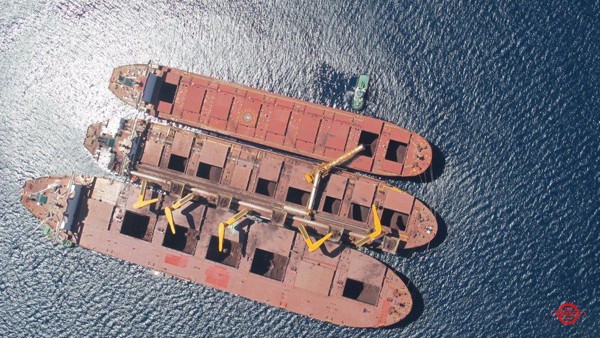Major Cocaine Bust: UK Border Force Seizes Record Shipment at London Gateway
In one of the UK’s largest drug seizures of the past decade, UK Border Force officers have seized cocaine with an estimated street value of £96 million (USD 130 million)...

Vale Brasil, Credits: Agencia Vale
![]() By Manolo Serapio Jr and David Stanway
By Manolo Serapio Jr and David Stanway
SINGAPORE/BEIJING, Feb 14 (Reuters) – China will only allow ships with capacity of up to 250,000 deadweight tonnes to berth at its ports from July 1, its transport ministry said, effectively keeping a ban on Brazilian miner Vale’s huge iron ore vessels in place since January 2012.
It would be the latest setback for the world’s top iron ore producer which has been hoping China, the biggest buyer of the raw material, would lift the ban aimed at shielding its shippers.
Vale invested more than $2 billion to build several 400,000-dwt vessels to slash transport costs to China by up to a third and better compete with Australian rivals Rio Tinto and BHP Billiton .
The expansion of Chinese ports has been “irrational” and they now need to shed capacity to meet a number of requirements, including the maximum capacity limit of 250,000 dwt on ships allowed to berth, according to a statement posted on the Ministry of Transport’s website on Feb. 10.
The new rules will come into effect from July 1, the statement said, adding “every port authority must direct port enterprises to restructure terminals in accordance with the requirements of large-scale shipping development.”
While the Chinese ban does increase Vale’s freight cost, deployment of these ships is not a problem since it is able to call on other ports, said Jayendu Krishna, director at shipping consultancy Drewry Maritime Advisors.
“In the overall scheme of things considering the global distribution of iron ore, cost implication probably will not be too great,” said Krishna.
There are 30 Valemaxes sailing currently, some owned by Vale and the rest by other operators. Vale has said it was losing $2-$3 per tonne in iron ore shipping costs because of the Chinese ban.
Due to the ban, the miner set up a transshipment terminal in the Philippines in February 2012 where the Valemaxes can transfer iron ore into smaller ships bound for China. It is also building an iron ore storage and distribution hub in Malaysia, expected to start operations this year.

The ships have also been docking at other ports, including in Italy, Japan, Oman and South Korea, said Krishna.
‘PATIENCE’
In August, the transport ministry said in a draft document published on its website that ports may be allowed to receive ships based on the inherent capacity of their infrastructure, pending regulatory approvals. The ministry then sought feedback from the local marine industry.
Three months later, the official Xinhua news agency reported that China’s state-owned Shandong Shipping Corpsigned a $500 million deal with Vale to operate four of the Valemaxes.
China barred the Valemaxes from its ports about a month after the first of the giant vessels docked at Dalian portin December 2011. But a Valemax managed to dock at China’s Lianyungang port in April last year.
Besides Dalian and Lianyungang, other ports that may be able to accept Valemax vessels include Dongjiakou and Caofeidian, as well as Zhanjiang and Ningbo Zhoushan, which are under construction, industry sources said.
Most of the ships were built in Chinese shipyards and partly financed by the country’s international development bank.
In December last year, officials at Vale said the acceptance of these giant vessels in China’s ports will require “patience.” (Additional reporting by Keith Wallis in Singapore; Editing by Subhranshu Sahu)
(c) 2014 Thomson Reuters, All Rights Reserved

Sign up for gCaptain’s newsletter and never miss an update

Subscribe to gCaptain Daily and stay informed with the latest global maritime and offshore news


Stay informed with the latest maritime and offshore news, delivered daily straight to your inbox
Essential news coupled with the finest maritime content sourced from across the globe.
Sign Up